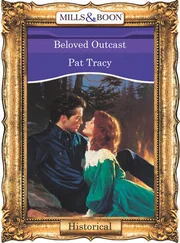When he asked her if they treated her all right over there, she said more than all right. Miss Bodwin taught her stuff. He asked her what stuff and she laughed and said book stuff. "She says I might go to Oberlin. She's experimenting on me." And he didn't say, "Watch out. Watch out. Nothing in the world more dangerous than a white schoolteacher." Instead he nodded and asked the question he wanted to.
"Your mother all right?"
"No," said Denver. "No. No, not a bit all right."
"You think I should stop by? Would she welcome it?"
"I don't know," said Denver. "I think I've lost my mother, Paul D."
They were both silent for a moment and then he said, "Uh, that girl. You know. Beloved?"
"Yes?"
"You think she sure 'nough your sister?"
Denver looked at her shoes. "At times. At times I think she was- more." She fiddled with her shirtwaist, rubbing a spot of something.
Suddenly she leveled her eyes at his. "But who would know that better than you, Paul D? I mean, you sure 'nough knew her."
He licked his lips. "Well, if you want my opinion-"
"I don't," she said. "I have my own."
"You grown," he said.
"Yes, sir."
"Well. Well, good luck with the job."
"Thank you. And, Paul D, you don't have to stay 'way, but be careful how you talk to my ma'am, hear?"
"Don't worry," he said and left her then, or rather she left him because a young man was running toward her, saying, "Hey, Miss Denver. Wait up."
She turned to him, her face looking like someone had turned up the gas jet.
He left her unwillingly because he wanted to talk more, make sense out of the stories he had been hearing: whiteman came to take Denver to work and Sethe cut him. Baby ghost came back evil and sent Sethe out to get the man who kept her from hanging. One point of agreement is: first they saw it and then they didn't. When they got Sethe down on the ground and the ice pick out of her hands and looked back to the house, it was gone. Later, a little boy put it out how he had been looking for bait back of 124, down by the stream, and saw, cutting through the woods, a naked woman with fish for hair.
As a matter of fact, Paul D doesn't care how It went or even why. He cares about how he left and why. Then he looks at himself through Garner's eyes, he sees one thing. Through Sixo's, another.
One makes him feel righteous. One makes him feel ashamed. Like the time he worked both sides of the War. Running away from the Northpoint Bank and Railway to join the 44th Colored Regiment in Tennessee, he thought he had made it, only to discover he had arrived at another colored regiment forming under a commander in New Jersey. He stayed there four weeks. The regiment fell apart before it got started on the question of whether the soldiers should have weapons or not. Not, it was decided, and the white commander had to figure out what to command them to do instead of kill other white men. Some of the ten thousand stayed there to clean, haul and build things; others drifted away to another regiment; most were abandoned, left to their own devices with bitterness for pay. He was trying to make up his mind what to do when an agent from Northpoint Bank caught up with him and took him back to Delaware, where he slave-worked a year. Then Northpoint took $300 in exchange for his services in Alabama, where he worked for the Rebellers, first sorting the dead and then smelting iron. When he and his group combed the battlefields, their job was to pull the Confederate wounded away from the Confederate dead. Care, they told them. Take good care. Coloredmen and white, their faces wrapped to their eyes, picked their way through the meadows with lamps, listening in the dark for groans of life in the indifferent silence of the dead. Mostly young men, some children, and it shamed him a little to feel pity for what he imagined were the sons of the guards in Alfred, Georgia.
In five tries he had not had one permanent success. Every one of his escapes (from Sweet Home, from Brandywine, from Alfred, Georgia, from Wilmington, from Northpoint) had been frustrated. Alone, undisguised, with visible skin, memorable hair and no whiteman to protect him, he never stayed uncaught. The longest had been when he ran with the convicts, stayed with the Cherokee, followed their advice and lived in hiding with the weaver woman in Wilmington, Delaware: three years. And in all those escapes he could not help being astonished by the beauty of this land that was not his. He hid in its breast, fingered its earth for food, clung to its banks to lap water and tried not to love it. On nights when the sky was personal, weak with the weight of its own stars, he made himself not love it. Its graveyards and low-lying rivers. Or just a house--solitary under a chinaberry tree; maybe a mule tethered and the light hitting its hide just so. Anything could stir him and he tried hard not to love it.
After a few months on the battlefields of Alabama, he was impressed to a foundry in Selma along with three hundred captured, lent or taken coloredmen. That's where the War's end found him, and leaving Alabama when he had been declared free should have been a snap. He should have been able to walk from the foundry in Selma straight to Philadelphia, taking the main roads, a train if he wanted to, or passage on a boat. But it wasn't like that. When he and two colored soldiers (who had been captured from the 44th he had looked for) walked from Selma to Mobile, they saw twelve dead blacks in the first eighteen miles. Two were women, four were little boys. He thought this, for sure, would be the walk of his life.
The Yankees in control left the Rebels out of control. They got to the outskirts of Mobile, where blacks were putting down tracks for the Union that, earlier, they had torn up for the Rebels. One of the men with him, a private called Keane, had been with the Massachusetts 54th. He told Paul D they had been paid less than white soldiers. It was a sore point with him that, as a group, they had refused the offer Massachusetts made to make up the difference in pay. Paul D was so impressed by the idea of being paid money to fight he looked at the private with wonder and envy.
Keane and his friend, a Sergeant Rossiter, confiscated a skiff and the three of them floated in Mobile Bay. There the private hailed a Union gunboat, which took all three aboard. Keane and Rossiter disembarked at Memphis to look for their commanders. The captain of the gunboat let Paul D stay aboard all the way to Wheeling, West Virginia. He made his own way to New Jersey.
By the time he got to Mobile, he had seen more dead people than living ones, but when he got to Trenton the crowds of alive people, neither hunting nor hunted, gave him a measure of free life so tasty he never forgot it. Moving down a busy street full of whitepeople who needed no explanation for his presence, the glances he got had to do with his disgusting clothes and unforgivable hair. Still, nobody raised an alarm. Then came the miracle. Standing in a street in front of a row of brick houses, he heard a whiteman call him ("Say there!
Yo!") to help unload two trunks from a coach cab. Afterward the whiteman gave him a coin. Paul D walked around with it for hours- not sure what it could buy (a suit? a meal? a horse?) and if anybody would sell him anything. Finally he saw a greengrocer selling vegetables from a wagon. Paul D pointed to a bunch of turnips. The grocer handed them to him, took his one coin and gave him several more. Stunned, he backed away. Looking around, he saw that nobody seemed interested in the "mistake" or him, so he walked along, happily chewing turnips. Only a few women looked vaguely repelled as they passed. His first earned purchase made him glow, never mind the turnips were withered dry. That was when he decided that to eat, walk and sleep anywhere was life as good as it got. And he did it for seven years till he found himself in southern Ohio, where an old woman and a girl he used to know had gone.
Читать дальше











